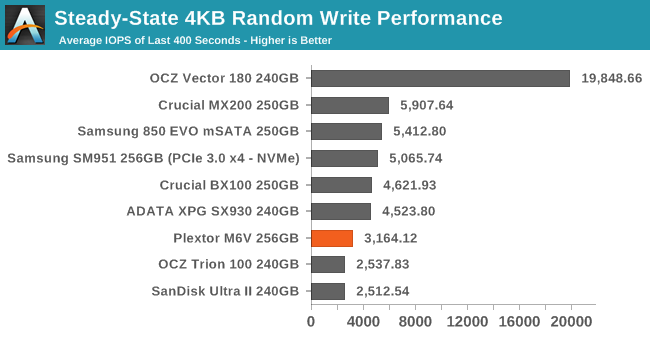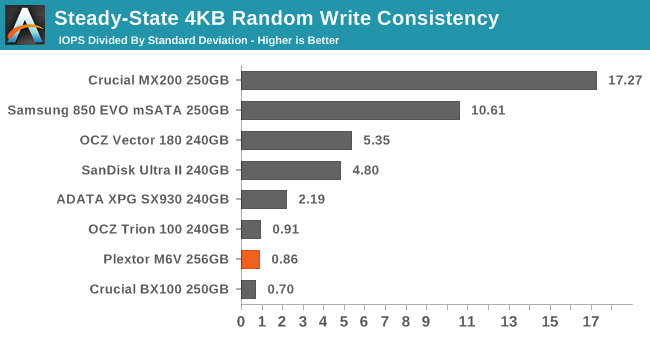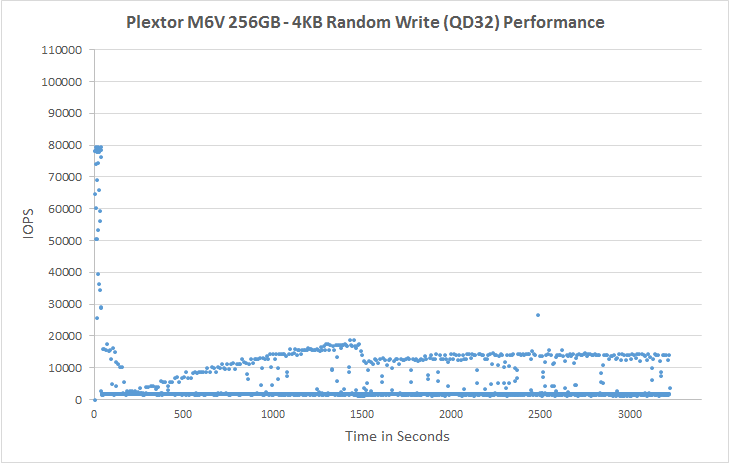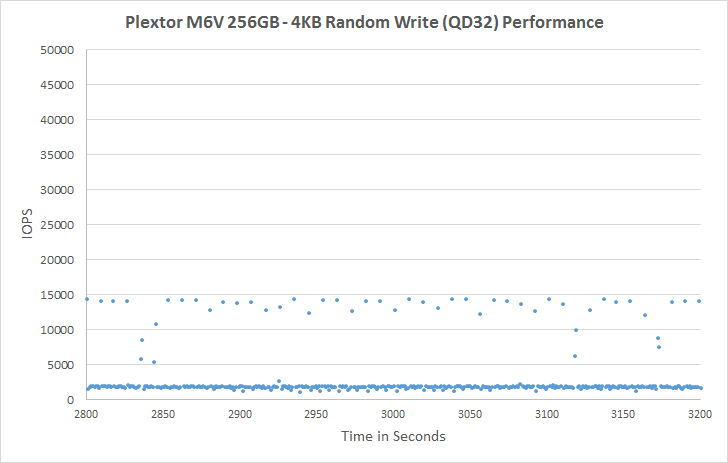The Plextor M6V (256GB) SSD Review
by Billy Tallis on October 12, 2015 8:00 AM ESTPerformance Consistency
Our performance consistency test saturates the drive with 4kB random writes for a full hour, with a queue depth of 32, the maximum supported by the AHCI protocol used by SATA and most PCIe drives. This puts the drive's controller under maximum stress and writes enough data to exhaust all free space and spare area on the drive. This is an unrealistic workload for any client use, but it provides a worst-case scenario for long-term heavy use, and it sheds light on how different SSD controllers behave and if their performance will hold up as they fill up.
The average of the last 400 seconds of the test gives us a steady-state IOPS rating that is usually very different from what the manufacturer specifies for a new, empty drive. We also quantify the consistency of the drive's random write performance, and provide plots of the performance over the course of the test.

The M6V's steady-state performance falls well behind the Crucial BX100 and only slightly ahead of drives using TLC NAND, pointing to either significant firmware differences or lower performance from the Toshiba 15nm MLC than Micron's 16nm MLC.

Plextor is able to eke out a little more consistency from the SM2246EN, but unfortunately this is due to the best-case being worse, rather than a significant improvement in the worst-case IOPS.
 |
|||||||||
| Default | |||||||||
Looking at the whole duration of the test, we see that once the M6V is filled and performance takes a nosedive, the M6V has a very slow recovery toward its steady state of occasionally reaching around 15k IOPS. Like the BX100, it has a pretty solid baseline and there are no garbage-collection pauses that drop it in to hard drive territory.
 |
|||||||||
| Default | |||||||||










51 Comments
View All Comments
StrangerGuy - Monday, October 12, 2015 - link
Yet another new SSD article on AT that ends up showing how it gets destroyed by Samsung in overall specs/price.franz899 - Monday, October 12, 2015 - link
Actually the Crucial BX100 is a better choice looking at the scores.medi03 - Monday, October 12, 2015 - link
Nope, not to note it isn't even present on many screens and MX200 is a different product.SmokingCrop - Tuesday, October 13, 2015 - link
The BX series is better bang for the buck, you won't notice the speed difference with the popular samsung drives.salimbest83 - Wednesday, October 14, 2015 - link
im shopping for new 240GB+ ssd. looks like BX100 is the way to go rite?Billie Boyd - Friday, November 27, 2015 - link
I rather go with AMD Radeon R7 series. Its one of the highly rated high drives in the market (see http://www.consumerrunner.com/top-10-best-hard-dri... for example)emn13 - Tuesday, October 13, 2015 - link
Assuming this is a low-end drive i.e. cheaper than the 850 pro, it looks like it outperforms the 850 evo mSata pretty much across the board, getting close to crucial's BX100.FriendlyUser - Tuesday, October 13, 2015 - link
As an owner of 2x840 EVO and 2xPlextor, I can tell you the Samsung's bug was a major disappointment. Read performance after months simply sucks and I had to patch the firmware 2-3 times and regularly "manually" freshen the data with the samsung tool. I have way more confidence in the Plextor firmware. Never again Samsung.AnnonymousCoward - Friday, October 16, 2015 - link
...yet another SSD article on AT that focuses on the pointlessness of non-real world benchmarks. Readers will leave this article without having a clue what boot time differences to expect between drives, or any other metric. I've been saying this for years. HardOCP finally caught on. http://tinyurl.com/pvyzmaudj_aris - Monday, October 12, 2015 - link
What is the purpose of reviewing SATA SSD drives? Anyone in the market for a drive should either buy a spinning HDD for storage or a PCIe for speed.